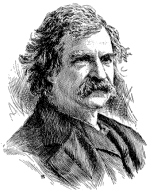The Boys’ Life of Mark Twain
by Paine

LIII. Mark Twain Pays His Debts
Mark Twain wrote much and well during this period, in spite of his social life. His article “Concerning the Jews” was written that first winter in Vienna–a fine piece of special pleading; also the greatest of his short stories–one of the greatest of all short stories–"The Man that Corrupted Hadleyburg.”
But there were good reasons why he should write better now; his mind was free of a mighty load–he had paid his debts!
Soon after his arrival in Vienna he had written to Mr. Rogers:
“Let us begin on those debts. I cannot bear the weight any longer.
It totally unfits me for work.”
He had accumulated a large sum for the purpose, and the royalties from the new book were beginning to roll in. Payment of the debts was begun. At the end of December he wrote again:
“Land, we are glad to see those debts diminishing. For the first
time in my life I am getting more pleasure from paying money out
than from pulling it in.”
A few days later he wrote to Howells that he had “turned the corner"; and again:
“We’ve lived close to the bone and saved every cent we could, and
there’s no undisputed claim now that we can’t cash . . . . I
hope you will never get the like of the load saddled on to you that
was saddled on to me, three years ago. And yet there is such a
solid pleasure in paying the things that I reckon it is worth while
to get into that kind of a hobble, after all. Mrs. Clemens gets
millions of delight out of it, and the children have never uttered
one complaint about the scrimping from the beginning.”
By the end of January, 1898, Clemens had accumulated enough money to make the final payments to his creditors. At the time of his failure he had given himself five years to achieve this result. But he had needed less than four. A report from Mr. Rogers showed that a balance of thirteen thousand dollars would remain to his credit after the last accounts were wiped away.
Clemens had tried to keep his money affairs out of the newspapers, but the payment of the final claims could not be concealed, and the press made the most of it. Head-lines shouted it. Editorials heralded Mark Twain as a second Walter Scott, because Scott, too, had labored to lift a great burden of debt. Never had Mark Twain been so beloved by his fellow-men.
One might suppose now that he had had enough of invention and commercial enterprises of every sort–that is, one who did not know Mark Twain might suppose this–but it would not be true. Within a month after his debts were paid he was negotiating with the Austrian inventor Szczepanik for the American rights in a wonderful carpet-pattern machine, and, Sellers- like, was planning to organize a company with a capital of fifteen hundred million dollars to control the carpet-weaving industries of the world. He wrote to Mr. Rogers about the great scheme, inviting the Standard Oil to “come in"; but the plan failed to bear the test of Mr. Rogers’s investigation and was heard of no more.
Samuel Clemens’s obligation to Henry Rogers was very great, but it was not quite the obligation that many supposed it to be. It was often asserted that the financier lent, even gave, the humorist large sums, and pointed out opportunities for speculation. No part of this statement is true. Mr. Rogers neither lent nor gave Mark Twain money, and never allowed him to speculate when he could prevent it. He sometimes invested Mark Twain’s own funds for him, but he never bought for him a share of stock without money in hand to pay for it in full–money belonging to, and earned by, Clemens himself.
What Henry Rogers did give to Mark Twain was his priceless counsel and time–gifts more precious than any mere sum of money–favors that Mark Twain could accept without humiliation. He did accept them, and never ceased to be grateful. He rarely wrote without expressing his gratitude, and we get the size of Mark Twain’s obligation when in one letter we read:
“I have abundant peace of mind again–no sense of burden. Work is
become a pleasure–it is not labor any longer.”
He wrote much and well, mainly magazine articles, including some of those chapters later gathered it his book on “Christian Science.” He reveled like a boy in his new freedom and fortunes, in the lavish honors paid him, in the rich circumstance of Viennese life. But always just beneath the surface were unforgetable sorrows. His face in repose was always sad. Once, after writing to Howells of his successes, he added:
“All those things might move and interest one. But how desperately
more I have been moved to-night by the thought of a little old copy
in the nursery of “At the Back of the North Wind.” Oh, what happy
days they were when that book was read, and how Susy loved it!”
 Continue...
Continue...![[Buy at Amazon]](http://images.amazon.com/images/P/B0006AHKG6.01.MZZZZZZZ.jpg)